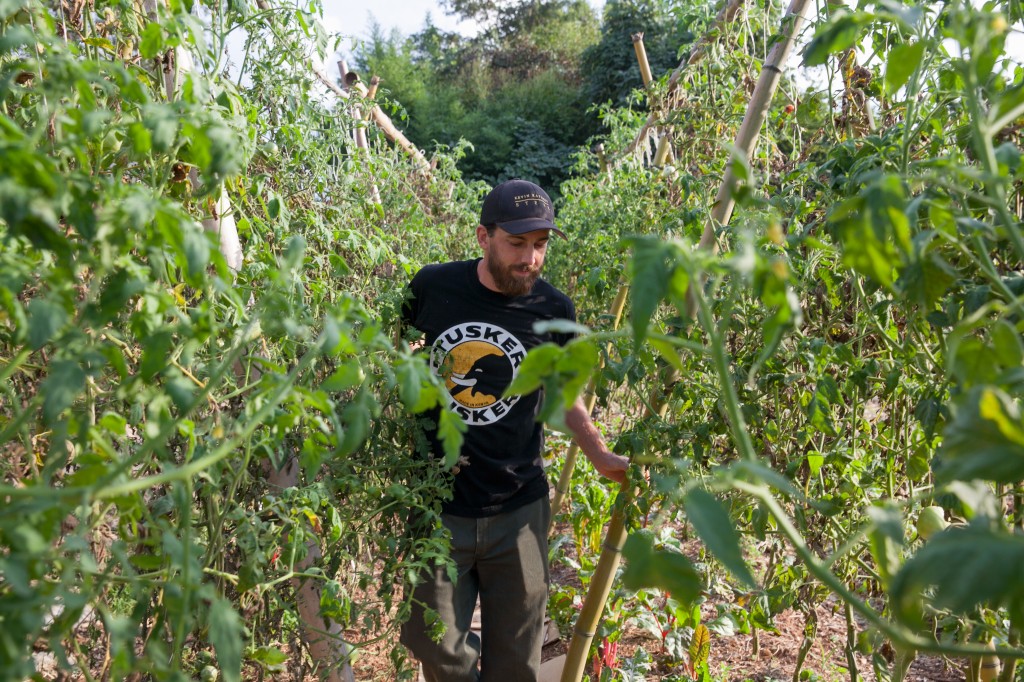
{written by 2014 CFM staff}
If you’re driving through Grant Park, you’ll likely miss the hyper-local food production happening in your neighborhood backyard. I almost did. Save the little blue truck with a camper top and cycling and farmers market stickers, the vacant lot on the edge of Grant Park is inconspicuous and seemingly lifeless. But park your car and walk past a dilapidated concrete block structure through a jungle-like pathway and what lies before you is a beautiful urban food oasis.
Brent Hall is an urban farmer. And Freewheel Farm is his niche.
A New England native, Hall got his start with farms several years ago while serving as a coordinator of agricultural programs for a worker rights non-profit. He became more interested in growing his own food, fell in love with the work and never turned back.
“Ever since then, it’s been all I’ve ever wanted to do,” Hall said.
He launched himself into the industry upon moving to Atlanta in 2011, working at a garden center and in produce distribution. Last year, Hall connected with a Grant Park landowner who was on board with his vision of managing land, growing food and selling to markets and restaurants. The landowner offered Hall the opportunity to try his hand at transforming the vacant lot—a real “game changer” that would allow him to “dig in” and do what he loves. However, it was not quite what he expected.
“There is absolutely nothing you can do with this land,” Hall thought on his first visit to the lot.
It was an overgrown mess—a jungle of weeds that had grown into ten-foot trees with debris everywhere. “It was really hard to see the potential of the land,” Hall said.
That is, until he threw a clearing party with his friends. The crew broke ground in April 2013 and Freewheel Farm has been growing ever since. Hall has also enjoyed the growth of relationships, community and partnerships through his urban farming venture.
“It’s incredible to have access to the land and gain a good friend out of it,” Hall said of his relationship with the landowner. He also became the first farm partner with Compostwheels, a nonprofit residential and commercial compost pickup service in Atlanta.
Through this consistent and highly efficient composting system, Hall turned degraded soil into rich, organic matter in just a year’s time. “You would’ve been hard-pressed to find a single worm in the whole field,” Hall said of when he started cultivating the lot. “Now, you can hardly turn a shovel-full over without seeing worms.”
But the weeds, pests and plant diseases are all constant problems that come with the territory of farming. Urban farming presents its own set of unique challenges. Oftentimes, urban farmers must begin with heavily depleted soil that has been graded, pushed around, dumped on and overgrown with weeds and kudzu, as well as the occasional theft.
However, Hall said there are benefits of creating a farm oasis in the middle of a city—there is a community of people who care about what Freewheel Farm is doing. Since the space has been cleared and maintained, a Grant Park neighbor shared with Hall that, for the first time in at least 25 years, it’s no longer an eyesore. In fact, it’s a place where parents can show their children how food is grown. It’s a haven for wildlife, insects and plants. It’s therapy for folks to reconnect to an agrarian past. It’s doing exactly what urban farms do best.
“You don’t have to look very hard to realize as a society we are becoming less and less healthy with our diets and our economy,” said Hall. At a time when our produce is shipped to and comes from all parts of the world, the benefits of choosing locally and fairly grown and harvested products are numerous. Hall shared a few:
- Food is grown for its nutritional value and flavor, rather than its ability to be shipped, shelved and stored.
- Mega-companies don’t get to dictate what our food choices are or what we eat.
- Dollars are kept in the local economy.
- Healthy ecosystems and green spaces are created and revitalized, especially in cities.
And what’s on the horizon for Freewheel Farm? Chickens, perhaps some other small farm animals, expansion of Hall’s mushroom logs and beehives. And definitely more flowers. Hall hopes to bring flowers to the Grant Park market next season. With a desire to bump up his production, Hall is also looking for new land to replicate what he already has going. Hall said his long-term goal is to be able to transport some of his produce by bicycle and have bicycles run some parts of the farm. Why? Well, he really likes bikes. Hence the name “Freewheel Farm,” dubbed after a “pretty cool bike part.”
As this one-man operation grows and expands, volunteers are critical to getting a lot of the work done. There are opportunities to harvest on Fridays and Saturdays, but Hall will gladly welcome an extra set of hands willing to pitch in and help anytime.
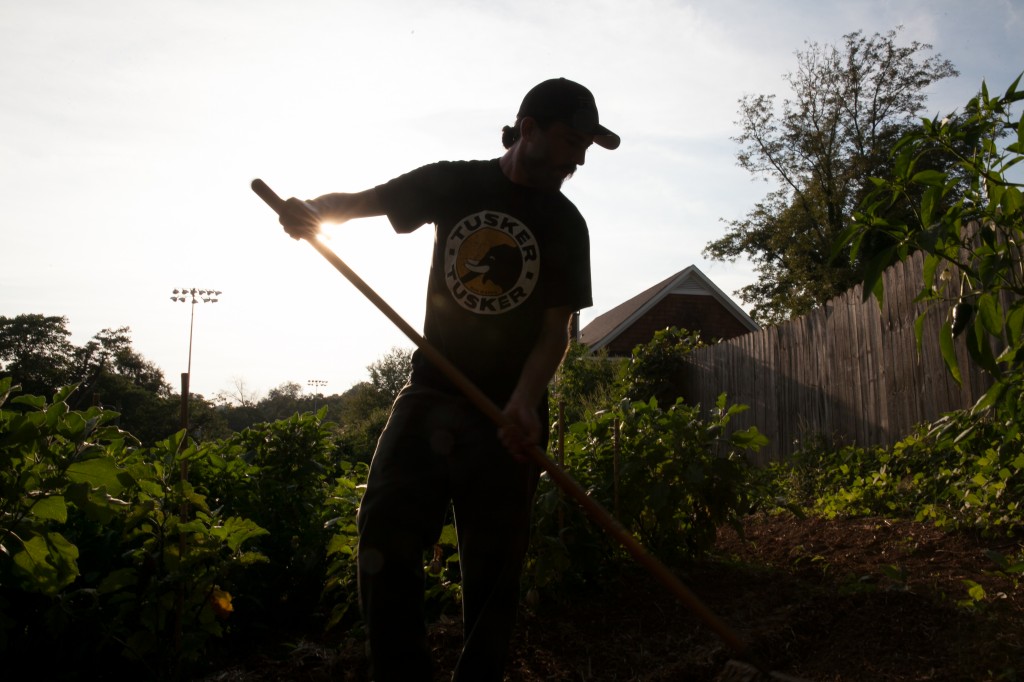
Hall reflected on his time in Atlanta with gratitude, as he described the spirit of Georgia farmers—not competitive, but close-knit and eager to share knowledge and information.
“It’s been an awesome couple of years getting such amazing support from customers, restaurants, the markets and other farmers,” he said.
You can find his produce at the Grant Park farmers market, Candler Park Market and in dishes at Wrecking Bar Brew Pub. To learn more about volunteering opportunities, connect with Hall via the Freewheel Farm Facebook page. And consider joining us for the second annual Metro Atlanta Tour de Farm on Saturday, October 18 to see Freewheel Farm firsthand.
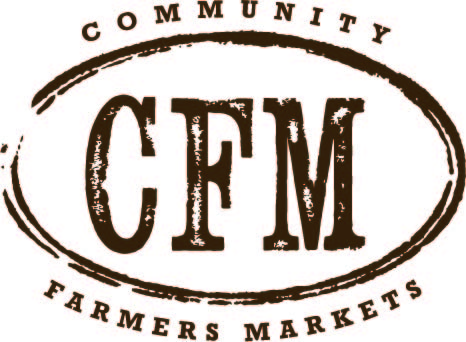
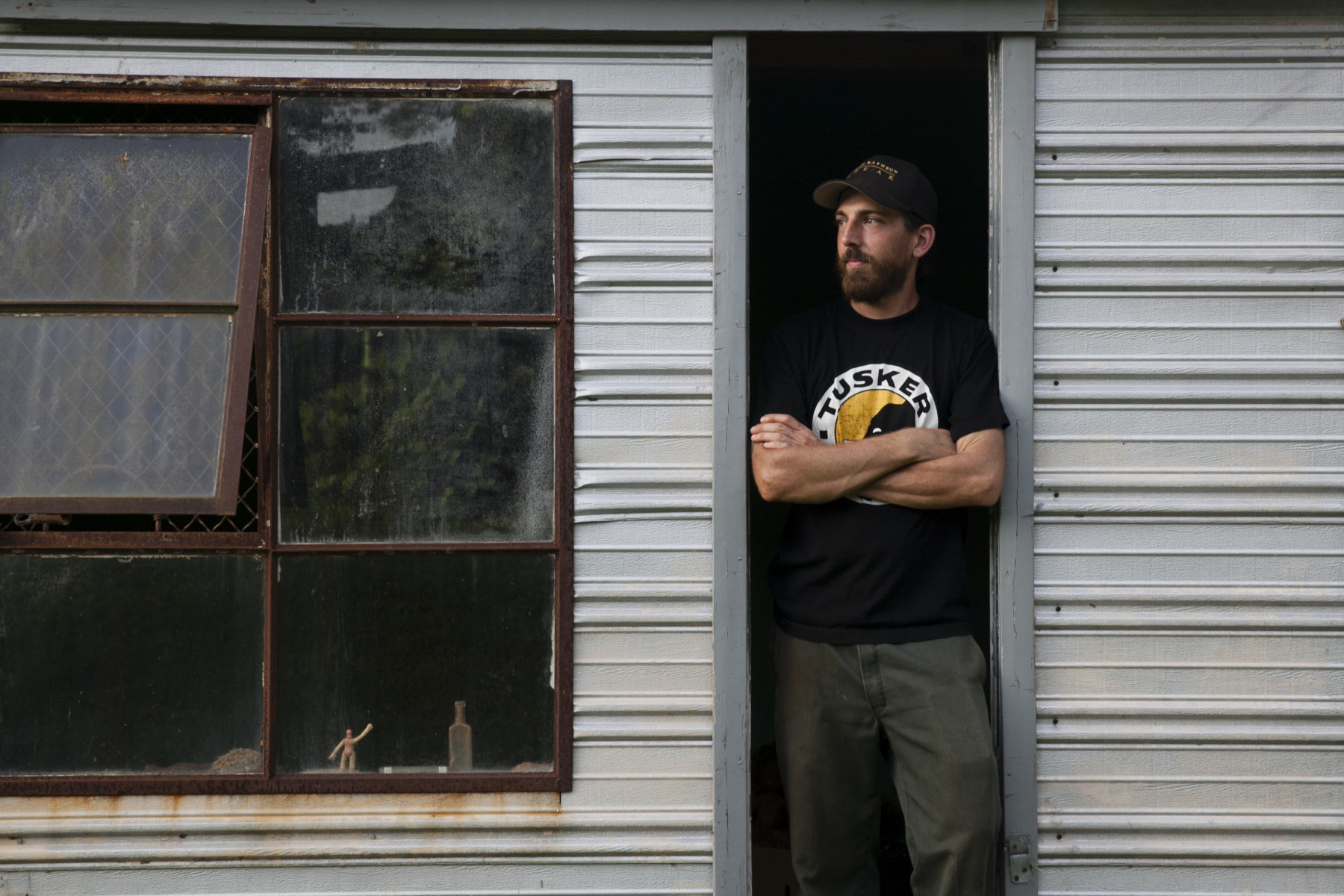
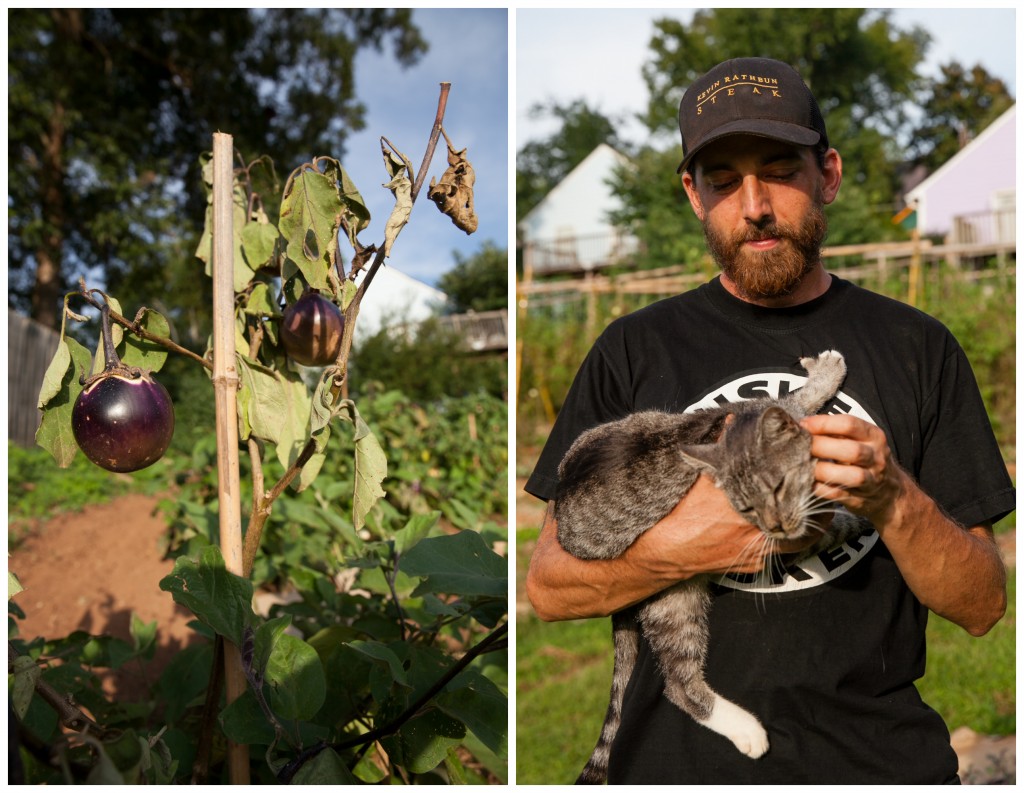
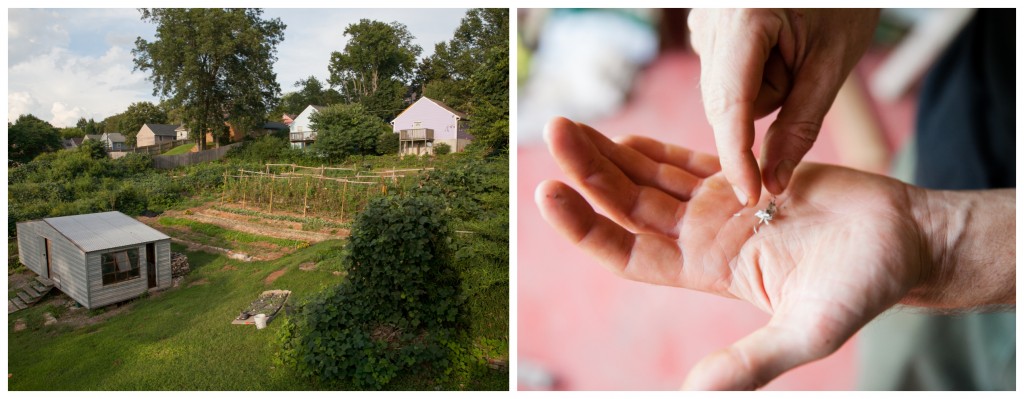
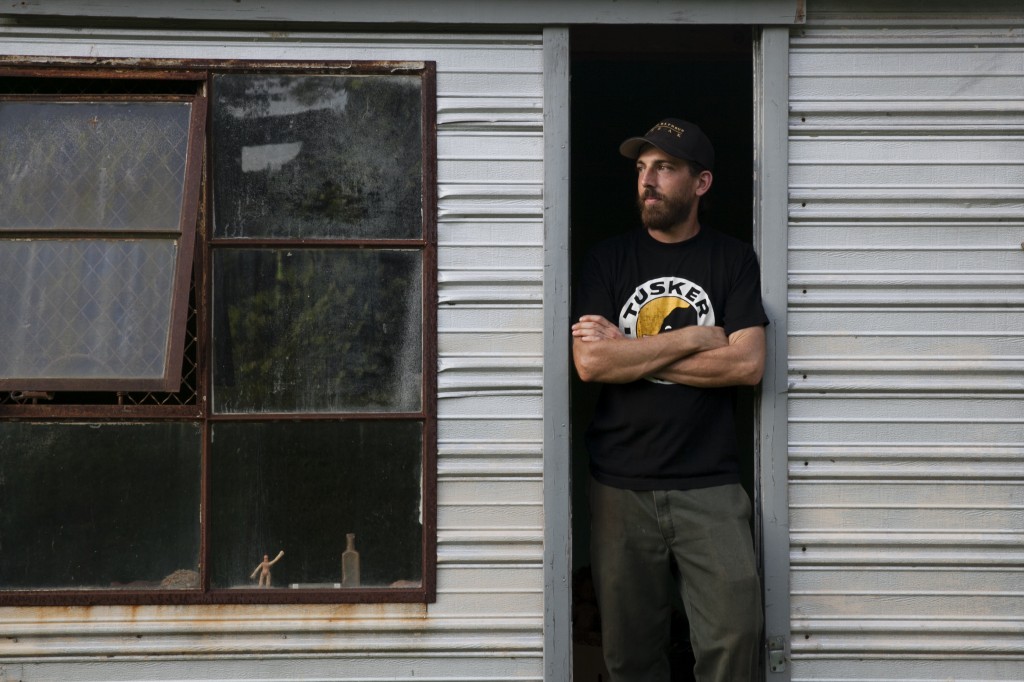
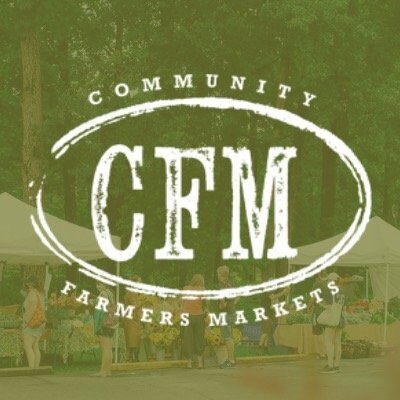

Pingback: Swell Voyage » Journeys to Activism Patagonia Event Tour: Our choices define us